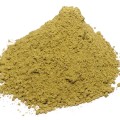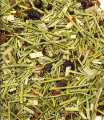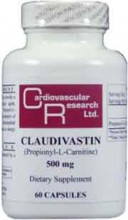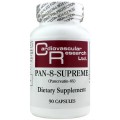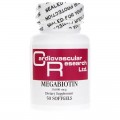 Loading... Please wait...
Loading... Please wait...- Home
- About Us
- Shipping, Returns & FAQ's
- Contact Us
-
For Your Information
- Canadian Customers Have a Choice if Shipping Via UPS
- Aura Cacia Homemade Aromatherapy Recipes
- Bella Nella Altered Art & Paper Crafts Blog
- Forms of Herbal Preparations
- Laundry Tips To Conserve Energy Blog from The Laundress
- The Story of Frontier Natural Products Co-Op
- Sovereign Silver Hydrosol and Aloe Protocol Stops Downward Spiral of Gut Dysbiosis
- Disclaimers
- Recommended Links
- RSS/Recent News
- The Story of Typhoon Housewares
- Reviews/Testimonials
- Raw Ingredients for Mfg
- Home
- Supplements
- Energy Boosters
- Claudivastin (Propionyl L-Carnitine) 333mg 60 Tabs Cardiovascular Research
- Home
- Supplements
- Amino Acids
- Claudivastin (Propionyl L-Carnitine) 333mg 60 Tabs Cardiovascular Research
Claudivastin (Propionyl L-Carnitine) 333mg 60 Tabs Cardiovascular Research
Product Description
![]()
![]() Energy Support
Energy Support
Claudivastin is scientifically designed to provide a direct release form of the physiologic agent‚ L-Carnitine. In human physiology‚ Propionyl-L-Carnitine plays an important role in the transport of essential fatty acids across the mitochondrial membrane where it serves as a substrate in energy metabolism.
Propionyl-L-carnitine is an amino acid that is naturally produced in the body. Amino acids are the building blocks of proteins. L-carnitine and acetyl-L-carnitine are also amino acids, and they are chemically related to propionyl-L-carnitine. In fact, the body can convert L-carnitine to propionyl-L-carnitine and acetyl-L-carnitine. But, no one knows whether the benefits of carnitines are interchangeable. Until more is known, don’t substitute one form of carnitine for another.
Propionyl-L-carnitine is used for treating leg pain (intermittent claudication) due to poor blood circulation (peripheral vascular disease, PVD). PVD is often caused by diabetes or “hardening of the arteries” (atherosclerosis). Propionyl-L-carnitine is also used to treat congestive heart failure (CHF).
Men with sexual performance problems (erectile dysfunction, ED) due to diabetes or poor circulation sometimes use propionyl-L-carnitine along with prescription medications. Older men who have symptoms of low testosterone levels sometimes use propionyl-L-carnitine in combination with acetyl-L-carnitine.
The propionyl-L-carnitine/acetyl-L-carnitine combination is also used to treat chronic fatigue syndrome (CFS).
Healthcare providers give propionyl-L-carnitine intravenously (by IV) for treating PVD and intermittent claudication; to improve wound healing in people with PVD; and to treat heart disease, including congestive heart failure, and chest pain (angina).
Propionyl-L-carnitine helps the body produce energy. It is important for heart function, muscle movement, and many other body processes. It also seems to help increase circulation.
Formerly known as Mitocarnitine Glycine Propionyl L-Carnitine (GPLC)
aka Glycine Propionyl-L-Carnitine HCl, Glycine Propionyl-L-Carnitine Hydrochloride, L-carnitine Propionyl, LPC, PLC, Propionil-L-Carnitina, Propionylcarnitine
Dosage: Take one or two capsules daily‚ or as directed by a physician.
Serving Size: 1 Capsule
Servings Per Container: 60
Amount Per Serving / % DV*
Propionyl-L-Carnitine HCL 333mg / **
*Percent Daily Values are based on a 2‚000 calorie diet.
**Daily Value not established.
Other Ingredients: Gelatin (capsule)‚ microcrystalline cellulose‚ dicalcium phosphate‚ l-leucine.
Abstract
Peripheral arterial disease (PAD) is a clinical manifestation of underlying aorto-iliac and leg atherosclerosis that is characterized by different stages of stenosis and obstruction. It affects approximately 12% of the adult population and about 20% of people over the age of 70 years, and is associated with increased cardiovascular (CV) and cerebrovascular morbidity. Intermittent
claudication (IC) is the major symptom of PAD; it is defmed as cramping leg pain (in the buttock, thigh, or call) while/after climbing one or two flights of stairs, or during walking. The goals of IC management are to: slow the progression of local and systemic atherosclerosis, prevent major fatal and nonfatal CV events (myocardial infarction and stroke), improve walking capacity,
prevent and reduce resting pain and cutaneous lesions. Propionyl L-carnitine is an acyl derivative of levocarnitine (L-carnitine) and is indicated for patients with peripheral arterial occlusive disease. It corrects secondary muscle camitine deficiency in patients with PAD, significantly improving the walking capacity; it is a free radical that produces positive effects on endothelial function; it protects from oxidative stress; and it enhances most measures of quality of life. The recent Trans-Atlantic Inter-Society Consensus II update recommends the use of propionyl L-camitine in combination with physical training to improve the symptoms associated with PAD. PMID: 19827991 [PubMed - indexed for MEDLINE]
References
webmd
University of Maryland Medical Center
You Recently Viewed...
Currency Converter
Choose a currency below to display product prices in the selected currency.




